DOWNLOAD NEWS 2013/6
Brian Wilson
Download News 2013/5 can be found here.
The Archive of earlier editions is here.
Correction
In my last DL News I inadvertently referred to Eugene Goossens (conductor
and composer) as the oboist who recorded Mozart with Colin Davis: it
was, of course, Leon Goossens. They were such a musical family –
not forgetting Sidonie, the harpist – that I got them confused.
My thanks to Barry Coward of Beulah for spotting the mistake.
Giuseppe VERDI (1813-1901) Bicentenary Bargain
50 Best Verdi
 Artists
include:
Artists
include:
CD1 – tenors and baritones: Plácido Domingo, José
Carreras, Luciano Pavarotti, Rolando Villazón, Roberto Alagna,
Tito Gobbi and Dietrich Fischer-Dieskau
CD2 – sopranos and mezzos: Maria Callas, Natalie Dessay, Victoria
de los Angeles and Montserrat Caballé
CD3 – choruses: La Scala, Milan, Royal Opera House, Covent Garden
and Welsh National Opera
Conductors include Herbert von Karajan, Riccardo Muti, Julius Redel
and Lorin Maazel
EMI 4338302 [3 CDs: 3:17:18] – from sainsburysentertainment.co.uk
(mp3)
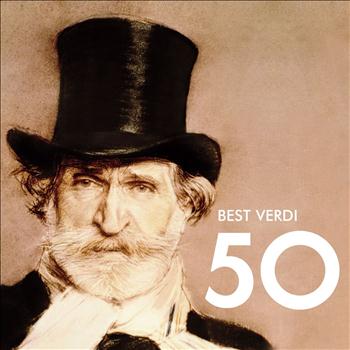 If
you don’t mind, or even prefer, your Verdi in chunks – and
less bleeding than their Wagner equivalents for the most part –
there’s a feast of Verdi singing here for the princely sum of £2.99.
Even the physical 3-CD set can be found online for around £6.
Don’t even consider the 7digital.com download for £22.99
or classicsonline.com at £19.99, prime examples of what Patrick
Waller refers to in his recent
article on the vagaries of download pricing! While I may quibble
about some of the choices – why choose Placido Domingo for the
opening Se quel guerrier io fossi … celeste Aïda, good
as he is, when EMI have Jussi Björling’s superb rendition
in their vaults? – I derived considerable pleasure from this release.
If you want Björling in Aïda, EMI can oblige with the
2-CD set The Very Best of Jussi Björling – review
and July
2012/1 DL Roundup: Bargain of the Month.
If
you don’t mind, or even prefer, your Verdi in chunks – and
less bleeding than their Wagner equivalents for the most part –
there’s a feast of Verdi singing here for the princely sum of £2.99.
Even the physical 3-CD set can be found online for around £6.
Don’t even consider the 7digital.com download for £22.99
or classicsonline.com at £19.99, prime examples of what Patrick
Waller refers to in his recent
article on the vagaries of download pricing! While I may quibble
about some of the choices – why choose Placido Domingo for the
opening Se quel guerrier io fossi … celeste Aïda, good
as he is, when EMI have Jussi Björling’s superb rendition
in their vaults? – I derived considerable pleasure from this release.
If you want Björling in Aïda, EMI can oblige with the
2-CD set The Very Best of Jussi Björling – review
and July
2012/1 DL Roundup: Bargain of the Month.
Most of all, I hope it will encourage at least some listeners to move
on from this kind of recording to single-CD highlights from individual
operas and the Requiem and eventually to complete performances
– a move which so many seem oddly reluctant to make. Such listeners
could do far worse than to start by choosing just one opera, complete
or highlighted, from the performances excerpted here. The Montserrat
Caballé/Placido Domingo/Riccardo Muti Aïda, for example,
from which excerpts are included on the 50 Best, though not quite ideal,
is well worth considering, as it has recently been reissued on EMI Opera
6406302 for as little as around £11 (or download from sainsburysentertainment.co.uk
for £8.99). See review
and a more sympathetic review
of earlier release. I’m not sure how the name Karajan got into
the file-name of the latter; it is Muti at the helm, not Karajan.
Witold LUTOSŁAWSKI (1913-1994) – Some Centenary Recommendations
Concerto for Orchestra (1954) [29:51]
Cello Concerto (1970) [25:20]
Rafał Kwiatkowski (cello)
Warsaw Philharmonic Symphony Orchestra/Antoni Wit – rec. December
2004. DDD.
Pdf booklet included
DUX DUX0499 [55:13] – from classicsonline.com
(mp3) or stream from Naxos Music Library
[‘This is music-making of a very high order and if you like the
coupling, don’t hesitate.’ See review
by Tony Haywood.]
Cello Concerto (1970) [23:26] – coupled with Henri DUTILLEUX
Cello Concerto: Tout un Monde lointain…
Mstislav Rostropovich (cello)
Orchestre de Paris/Witold Lutosławski – rec. 1974. ADD.
EMI CLASSICS 0724356786851 [52:37] – from classicsonline.com
(mp3) or 7digital.com
(mp3) or stream from Naxos Music Library
[‘This is an invaluable release’. See review
by Colin Clarke.]
 TH’s
sole reservation, that the Dux recording comes at full price
when Antoni Wit’s other Witold Lutosławski recordings are
on Naxos at budget price, is partly offset if you download from classicsonline.com
(mp3) for £7.99. That download also comes with the pdf booklet,
which is also available to subscribers to the Naxos Music Library, thereby
giving it an advantage over the classic Rostropovich recording (below).
On the other hand, you may well find yourself obtaining an equally idiomatic
recording of the Concerto for Orchestra, perhaps on the Chandos
recording listed below.
TH’s
sole reservation, that the Dux recording comes at full price
when Antoni Wit’s other Witold Lutosławski recordings are
on Naxos at budget price, is partly offset if you download from classicsonline.com
(mp3) for £7.99. That download also comes with the pdf booklet,
which is also available to subscribers to the Naxos Music Library, thereby
giving it an advantage over the classic Rostropovich recording (below).
On the other hand, you may well find yourself obtaining an equally idiomatic
recording of the Concerto for Orchestra, perhaps on the Chandos
recording listed below.
The EMI performance has classic status, with the work’s
dedicatee and composer 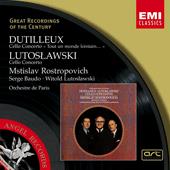 in
charge. The Dutilleux coupling, however, is not a work that I have ever
really been comfortable with. Despite numerous attempts with this recording
and another which was once available on World Record Club, I’ve
never been able to find the rhapsodic qualities which Felix Aprahamian
led me to expect when this recording was first released on ASD3145 in
1976. That apart, this performance of the Lutosławski has come
up very well in this new transfer.
in
charge. The Dutilleux coupling, however, is not a work that I have ever
really been comfortable with. Despite numerous attempts with this recording
and another which was once available on World Record Club, I’ve
never been able to find the rhapsodic qualities which Felix Aprahamian
led me to expect when this recording was first released on ASD3145 in
1976. That apart, this performance of the Lutosławski has come
up very well in this new transfer.
If it’s just the Dutilleux that you want, I note that it has just
been released, coupled with that composer’s Correspondances
and The Shadows of Time in a performance which has been highly
praised (Anssi Karttunen (cello) and Esa-Pekka Salonen, DG 479 1180).
You can make your own comparison between the Dux and EMI recordings
from Naxos Music Library, though the irksome short gaps which the NML
player inserts between continuous tracks made it even harder for me
to come to terms with the Dutilleux. At £6.99 the EMI is slightly
less expensive than the Dux (£7.99), though the vagaries of download
pricing mean that such might not be the case when you come to choose.
Symphony No.3; Chain No.3; Concerto for Orchestra
BBC Symphony Orchestra/Edward Gardner
CHANDOS CHAN5082 [69:56] – from theclassicalshop.net
(mp3, 16– and 24-bit lossless)
This recording, reviewed in my October 2010 Download
Roundup, is now additionally available in 24/96 and Studio Surround.
My initially very favourable reaction has been confirmed by subsequent
hearing and underlined by the reactions of other reviewers. William
Hedley made it Recording of the Month – here.
Budget-seekers should be aware of an mp3 Sony download from amazon.co.uk
of Esa-Pekka Salonen’s award-winning CBS recordings with the LAPO
of Symphonies Nos. 3 and 4 and Les Espaces du Sommeil for just
£2.67 – here.
Add the composer’s own recordings of Symphonies Nos. 1 and 2 (with
Concerto for Orchestra, etc., 3 CDs)* available in mp3 for £6.99
from classicsonline.com
and you have all four symphonies for less than £10.
* The same performances of the two symphonies and Concerto for Orchestra
are also available on an inexpensive EMI Gemini twofer: £5.99
from sainsburysentertainment.co.uk
or classicsonline.com.
Orchestral Works - Volume II
Symphonic Variations (1936-38) [9:29]
Concerto for Piano and Orchestra (1987-88)* [26:20]
Variations on a Theme of Paganini (1978)* [8:44]
Symphony No. 4 (1988-92) [22:24]
Louis Lortie (piano)*
BBC Symphony Orchestra/Edward Gardner – rec. 29-30 June 2011. DDD/DSD
Pdf booklet included
CHANDOS CHSA5098 [67:25] – from theclassicalshop.net
(mp3, 16– and 24-bit lossless and Studio Surround) or stream from
Naxos Music Library
[‘This is a release which followers of Gardner’s Lutosławski
series and fans of good 20th-century music should snap up without hesitation.’
See review
by Dominy Clements.]
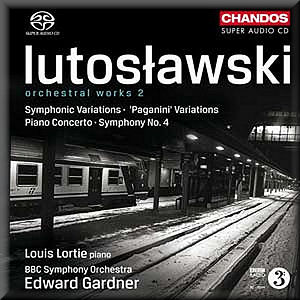 In
his endorsement of this recording, Dominy Clements gave an even stronger
recommendation to the CDAccord alternative coupling of Symphonies Nos.
2 and 4 (Wroclaw Philharmonic/Jacek Kaspszyk, ACD161-2 –
review),
but I have to say that I find No.2 too avant-garde for my liking,
which inclines me to prefer the Chandos coupling. If you choose the
CDAccord, however, it’s available from classicsonline.com (mp3)
or here
on CD for £14.50 post-free. I take DC’s word that this is
the top dog recording of No.2. If you would like to try it for yourself,
it’s available for streaming from Naxos Music Library; it certainly
receives a powerful performance, especially the second movement, and
the recording, even heard in streamed format, is very impressive.
In
his endorsement of this recording, Dominy Clements gave an even stronger
recommendation to the CDAccord alternative coupling of Symphonies Nos.
2 and 4 (Wroclaw Philharmonic/Jacek Kaspszyk, ACD161-2 –
review),
but I have to say that I find No.2 too avant-garde for my liking,
which inclines me to prefer the Chandos coupling. If you choose the
CDAccord, however, it’s available from classicsonline.com (mp3)
or here
on CD for £14.50 post-free. I take DC’s word that this is
the top dog recording of No.2. If you would like to try it for yourself,
it’s available for streaming from Naxos Music Library; it certainly
receives a powerful performance, especially the second movement, and
the recording, even heard in streamed format, is very impressive.
That’s true also of the very impressive performance of the Fourth
Symphony; I could almost recommend the CDAccord for that alone, were
it not for the existence of the Chandos, available in 24-bit versions,
including one in surround sound; the pdf booklet with the latter clinches
it for me.
Orchestral Works – Volume IV
Symphony No. 1 [24:36]
Partita for violin and orchestra with piano obbligato* [16:45]
Chain 2 – Dialogue for Violin and Orchestra* [19:18]
Dance Preludes** [9:49]
Tasmin Little (violin)*
Michael Collins (clarinet)**
BBC Symphony Orchestra/Edward Gardner – rec. April and July 2012.
DDD/DSD
Pdf booklet available
CHANDOS CHSA5108 [71:02] – from theclassicalshop.net
(mp3, 16– and 24-bit lossless)
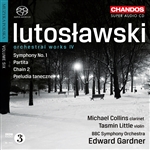 You’ll
have to excuse me for leaping from Volume II to the latest and last
in the series – Volume III, containing Symphony No.2 being hors
de combat for me. Your reaction to Volume IV is likely to depend
on your attitude to Symphony No.1 (1941-47), a work with which the composer
himself had an apparently ambiguous relationship. Though hardly imbued
with post-war melancholy, it isn’t exactly cheerful either, but
it’s a much more comfortable work to listen to than its successor
and I found Edward Gardner’s performance congenial. With the able
assistance of Tasmin Little and Michael Collins, the same is true of
the other works. Excellent recording, especially the 24-bit, and the
availability of a pdf booklet mean that those who have collected the
other volumes in the series can be confident with their successor.
You’ll
have to excuse me for leaping from Volume II to the latest and last
in the series – Volume III, containing Symphony No.2 being hors
de combat for me. Your reaction to Volume IV is likely to depend
on your attitude to Symphony No.1 (1941-47), a work with which the composer
himself had an apparently ambiguous relationship. Though hardly imbued
with post-war melancholy, it isn’t exactly cheerful either, but
it’s a much more comfortable work to listen to than its successor
and I found Edward Gardner’s performance congenial. With the able
assistance of Tasmin Little and Michael Collins, the same is true of
the other works. Excellent recording, especially the 24-bit, and the
availability of a pdf booklet mean that those who have collected the
other volumes in the series can be confident with their successor.
***
Giovanni Pierluigi da PALESTRINA (1525-1594)
Missa Ad cœnam Agni [34:54]
Surrexit pastor bonus a 8 [5:34]
Regina cœli [4:04]
Hæc dies à 6 [2:01]
Alleluia. Tulerunt Dominum (5vv) [3:06]
Terra tremuit (5vv) [2:17]
Angelus Domini descendit de cælo a 5 (5vv) [2:55]
Deus, Deus meus (5vv) [3:00]
Lauda anima mea (5vv) [2:19]
Benedicite gentes (5vv) [2:56]
Ad cœnam Agni providi (4/5vv) [7:26]
The Brabant Ensemble/Stephen Rice – rec. June 2012. DDD
Pdf booklet included with texts and translations
HYPERION CDA67978 [70:37] – from hyperion-records.co.uk
(mp3, 16– and 24-bit lossless)
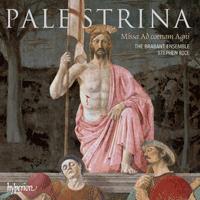 Like
the Prætorius Mass below, this is music for Eastertide but suitable
for any time of the year. Last month I welcomed the return on the Hyperion
Helios budget label of the Westminster Cathedral recording of Palestrina’s
Missa de Beata Virgine and Missa Ave Maria (CDH55420
– Reissue of the Month, DL
News 2013/5, due for reissue in May 2013 but available for download
in advance). The recording of the motet and mass Ad cœnam Agni
is even more welcome, since there appears to be no other recording of
the mass in the current catalogue and, until the recent appearance of
the third volume of The Sixteen’s Palestrina (COR16106 –
DL
News 2013/4), only one recording of the motet. The duplication of
that motet and Terra termuit from that Sixteen release is a small
price to pay for the Brabant Ensemble’s new recording.
Like
the Prætorius Mass below, this is music for Eastertide but suitable
for any time of the year. Last month I welcomed the return on the Hyperion
Helios budget label of the Westminster Cathedral recording of Palestrina’s
Missa de Beata Virgine and Missa Ave Maria (CDH55420
– Reissue of the Month, DL
News 2013/5, due for reissue in May 2013 but available for download
in advance). The recording of the motet and mass Ad cœnam Agni
is even more welcome, since there appears to be no other recording of
the mass in the current catalogue and, until the recent appearance of
the third volume of The Sixteen’s Palestrina (COR16106 –
DL
News 2013/4), only one recording of the motet. The duplication of
that motet and Terra termuit from that Sixteen release is a small
price to pay for the Brabant Ensemble’s new recording.
The singing is up to the Ensemble’s usual high standard and it’s
good to hear them in more familiar repertoire. If they sound a little
less exuberant than I might have liked for this celebratory music –
partly as a result of the recording needing a bit of a volume boost,
though that doesn’t entirely put matters right – I don’t
want to make that a major criticism. Not an outright winner, then, but
pretty close; it’s probably highly wishful thinking that an even
better may come along.
Michael PRÆTORIUS (1571 – 1621) Ostermesse
(Easter Mass)
Weser-Renaissance Bremen/Manfred Cordes – rec. May 2011. DDD.
Abridged pdf booklet included – no texts.
CPO 999953-2 [68:20] – from classicsonline.com
(mp3) or stream from Naxos Music Library
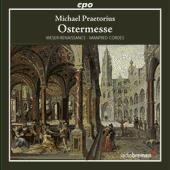 Easter
Day will be long gone by the time that you read this – I’m
writing it on the evening of Easter Eve – but it should still be
Eastertide and Prætorius’s music is suitable for any time
of year. If you enjoyed the DG Archiv recording of the Prætorius
Christmas Mass (download only or on CD from ArkivMusic)
this Easter equivalent should be almost equally congenial.
Easter
Day will be long gone by the time that you read this – I’m
writing it on the evening of Easter Eve – but it should still be
Eastertide and Prætorius’s music is suitable for any time
of year. If you enjoyed the DG Archiv recording of the Prætorius
Christmas Mass (download only or on CD from ArkivMusic)
this Easter equivalent should be almost equally congenial.
The only reason to wait would be in the hope that eclassical.com will
issue a lossless download in the near future, but that is likely to
cost more than classicsonline.com’s £4.99 and is not likely
to contain even the cut-down 4-page booklet. Why CPO booklets have to
be abridged in this way and, thus, come devoid of texts and translations,
is a mystery to me.
Antonio VIVALDI (1678-1741)
Solemn Vespers for the Assumption of the Virgin Mary (ed. Rinaldo
Alessandrini)
Concerto for two violins, two organs and double orchestra in F, RV584
[5:34]
Deus in adiutorium [0:14]
Domine ad adiuvandum me festina, RV593 [07:18]
Ascende læta, RV635 [7:59]
Dixit Dominus, RV594 [26:02]
Antifona: Assumpta est Maria in cælo [0:36]
Antifona al Laudate pueri: Maria Virgo assumpta est [0:30]
Laudate, pueri Dominum [2:00]
Antifona: Maria Virgo assumpta est [0:32]
Antifona: In odorem unguentorum [0:26]
Lætatus sum, RV607 [3:12]
Antifona: In odorem unguentorum [0:30]
Benedicta filia tua Domino [0:45]
Antifona al Nisi Dominus: Benedicta filia tua Domino [0:21]
Nisi Dominus, RV608 [21:10 ]
Benedicta filia tua Domino [00:45]
Antifona: Benedicta filia tua Domino [0:24]
Pulchra es et decora [0:49]
Antifona al Lauda Jerusalem: Pulchra es et decora [0:24]
Lauda Jerusalem, RV609 [06:29]
Pulchra es et decora [0:49]
Antifona: Pulchra es et decora [0:25]
Ave Maris stella [1:51]
Antifona al Magnificat: Hodie Maria Virgo [0:32]
Magnificat in g minor, RV610 [16:14]
Concerto for Violin and Double Orchestra in C, RV581, ‘The Assumption
of the Virgin’ [14:40]
Salve Regina, RV616 [16:29]
Gemma Bertagnolli, Roberta Invernizzi, Anna Simboli (soprano)
Sara Mingardo (contralto)
Gianluca Ferrarini (tenor)
Matteo Bellotto (baritone)
Antonio De Secondi, Mauro Lopes Ferreira, Francesca Vicari (violin)
Francesco Moi, Ignazio Schifanj (organ)
Concerto Italiano/Rinaldo Alessandrini
NAÏVE/OPUS111 OP30383 [76:42 + 76:23] – from eclassical.com
(mp3 and lossless) or stream from Naxos Music Library (no booklet from
either source)
[See review
by Kevin Sutton – ‘Highly recommended’ – and review
by Robert Hugill: ‘That the music on this disc is all given in
stunning performances means that one is inclined to skate over the fact
that the structure of the disc is entirely speculative.’ Now available
on CD only as part of a 4-CD set OP30516.]
Music for Vespers
Domine in adiutorium meum intende/ Domine ad adiuvandum me festina,
RV593 [8:53]
Beatus vir, RV597 [27:07]
Stabat Mater, RV621 [18:48]
Magnificat in g minor, RV610 [14:13]
Ex Cathedra/Jeffrey Skidmore – rec.1991. DDD.
Pdf booklet included
MUSICAL CONCEPTS ALTO ALC1176 [69:51] – from classicsonline.com
or stream from Naxos Music Library
Vespers of Sorrow
Stabat Mater, RV621 [15:20]
Concerto for Strings in E flat, Sonata al Santo Sepolcro, RV130
[3:09]
Nisi Dominus (Psalm 126), RV608 [16:08]
Magnificat, RV611 [16:53]
Jakub Burzynski (counter-tenor)
La Tempesta – rec. January 2004. DDD.
Pdf booklet included
BIS BIS-CD-1426 [54:35] – from eclassical.com
(mp3 and lossless)
[Recording of the Month – see review
by Michael Cookson.]
Concerto ripieno in C, Op.114 [6:15]
Cessate, omai cessate, RV684a [12:20]
Concerto for Strings in E-flat, Sonata al Santo Sepolcro, RV130
[5:09]
Introduzione al Filiæ mestæ in c minor, RV638 [9:34]
Stabat Mater in f minor, RV621 [18:54]
Andreas Scholl (alto)
Ensemble 415/Chiara Banchini (violin) – rec.c.1995. DDD.
HARMONIA MUNDI HMC901571 (36106379) [52:12] – from eclassical.com
(mp3 and lossless)
 Opus111:
a comprehensive collection, though the title is to be taken with a pinch
of salt: there’s no such thing as the Vivaldi Vespers,
sorrowful or otherwise, but it’s conceivable that a similar programme
could have been put on in a concert performance in a church in Venice.
All the sacred vocal music here – and, indeed, on the other recordings
– is available from Hyperion in excellent performances from the
King’s Consort (CDS44171/81, 11 CDs at a special price –
review
– also available separately*). I really don’t wish to choose
between the two but at the hands of Rinaldo Alessandrini and his first-rate
team the music sounds a little more energetic, by which I don’t
mean to imply that King’s performances are not heartfelt, and he
includes the chanted antiphons which King doesn’t perform. Only
the lack of texts – and these are fairly readily available –
prevents the most wholehearted recommendation.
Opus111:
a comprehensive collection, though the title is to be taken with a pinch
of salt: there’s no such thing as the Vivaldi Vespers,
sorrowful or otherwise, but it’s conceivable that a similar programme
could have been put on in a concert performance in a church in Venice.
All the sacred vocal music here – and, indeed, on the other recordings
– is available from Hyperion in excellent performances from the
King’s Consort (CDS44171/81, 11 CDs at a special price –
review
– also available separately*). I really don’t wish to choose
between the two but at the hands of Rinaldo Alessandrini and his first-rate
team the music sounds a little more energetic, by which I don’t
mean to imply that King’s performances are not heartfelt, and he
includes the chanted antiphons which King doesn’t perform. Only
the lack of texts – and these are fairly readily available –
prevents the most wholehearted recommendation.
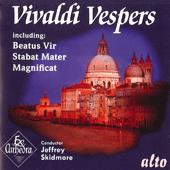 Alto:
this is the least expensive of the versions listed here but the quality
of the performance, presentation and recording, formerly available from
ASV Gaudeamus, in no way reflects the price. Indeed, it’s more
attractive than the Opus111 as a download because it comes with a decent
booklet of notes, texts and translations which the other lacks. If you
are looking for a single CD of Vivaldi’s church music at a budget
price you need look no further.
Alto:
this is the least expensive of the versions listed here but the quality
of the performance, presentation and recording, formerly available from
ASV Gaudeamus, in no way reflects the price. Indeed, it’s more
attractive than the Opus111 as a download because it comes with a decent
booklet of notes, texts and translations which the other lacks. If you
are looking for a single CD of Vivaldi’s church music at a budget
price you need look no further.
 BIS:
the cover is a bit off-putting and the occasion is again putative, as
with the Opus111, but that’s the only problem. I should add that
another reviewer – not on MusicWeb International – summing
up the available versions of Vivaldi’s Stabat Mater, thought
this recording doleful and histrionic, a ghastly disc devoid of virtue.
I must admit that I found the drumbeat accompaniment at the start and
intermittently throughout tedious. In which case I suggest that you
sample this recording – in toto from Naxos Music Library
if you have access, or by sampling the extracts from each track which
eclassical.com offers. If that suggests that this is not the recording
for you, then it’s either the Hyperion – details of complete
set above or of Volume 5 below – or the award-winning Harmonia
Mundi.
BIS:
the cover is a bit off-putting and the occasion is again putative, as
with the Opus111, but that’s the only problem. I should add that
another reviewer – not on MusicWeb International – summing
up the available versions of Vivaldi’s Stabat Mater, thought
this recording doleful and histrionic, a ghastly disc devoid of virtue.
I must admit that I found the drumbeat accompaniment at the start and
intermittently throughout tedious. In which case I suggest that you
sample this recording – in toto from Naxos Music Library
if you have access, or by sampling the extracts from each track which
eclassical.com offers. If that suggests that this is not the recording
for you, then it’s either the Hyperion – details of complete
set above or of Volume 5 below – or the award-winning Harmonia
Mundi.
 Harmonia
Mundi: apart from the fairly short playing time – there’s
enough room for the alto setting of Nisi Dominus, RV608, to have
been included – this might well be your ideal version of the Stabat
Mater and was indeed chosen as such in the comparative review to
which I’ve already referred. After the short Concerto in C, the
programme opens with a most powerful performance of the secular aria
Cessate, omai cessate. Whereas Andreas Scholl’s voice doesn’t
always have the power in live opera performance – perhaps inevitably
when a counter-tenor takes on a castrato role – there’s almost
too much oomph here unless you turn the volume down a notch.
Harmonia
Mundi: apart from the fairly short playing time – there’s
enough room for the alto setting of Nisi Dominus, RV608, to have
been included – this might well be your ideal version of the Stabat
Mater and was indeed chosen as such in the comparative review to
which I’ve already referred. After the short Concerto in C, the
programme opens with a most powerful performance of the secular aria
Cessate, omai cessate. Whereas Andreas Scholl’s voice doesn’t
always have the power in live opera performance – perhaps inevitably
when a counter-tenor takes on a castrato role – there’s almost
too much oomph here unless you turn the volume down a notch.
The Sonata al Santo Sepolcro is given greater weight than on
BIS without sounding heavy.
* The Hyperion edition doesn’t include the orchestral works or
Cessate, omai cessate; details of separate volumes:
• RV593, RV597 on Volume 3, CDA66789 – download currently
discounted at £4.00
• RV594, RV610a on Volume 1, CDA66769. There is only one
Vivaldi setting of the Magnificat, but it exists in various revisions
as RV610a-b and 611. RV610b also on Hyperion CDH55190 at budget
price
• RV607 on Volume 7, CDA66819
• RV608 on Volume 6, CDA66809
• RV621 on Volume 5, CDA66799
• RV635 on Volume 9, CDA66839
Domenico SARRI (1679-1744)
Missa [46:20]
Dixit Dominus (Psalm 109 (110)) [26:45]
Anja Zügner, Maria Perlt (soprano)
Annekathrin Laabs (mezzo)
Andreas Post (tenor)
Wolf Matthias Friedrich (bass)
Sächsisches Vocalensemble
Batzdorfer Hofkapelle/Matthias Jung – rec. January 2011. DDD.
CPO 777726-2 [73:24] – from eclassical.com
(mp3 and lossless) or stream from Naxos Music Library 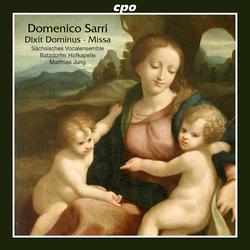 (abridged
pdf booklet included).
(abridged
pdf booklet included).
A neglected Neapolitan older contemporary of Bach and Handel, who doesn’t
even feature as a name in the Oxford Companion to Music, Sarri
(also known as Sarro) may not be in the same league as those contemporaries,
but the mass and extended psalm setting included here are certainly
well worth hearing. Performance and recording, especially in lossless
format, are well up to CPO’s high standards, so that only the lack
of a proper booklet hinders a solid recommendation: the ‘booklet’
which classicsonline.com and Naxos Music Library offer is the usual
cut-down affair.
A Recording of the Month
Johann Sebastian BACH (1685-1750)
 Concerto
for two violins in d minor, BWV1043* [15:35]
Concerto
for two violins in d minor, BWV1043* [15:35]
Violin Concerto in E, BWV1042 [16:19]
Violin Concerto in a minor, BWV1041 [13:36]
Concerto for three violins in D, BWV1064R** [15:58]
Petra Müllejans, Gottfried von der Golz*/**, Anna Katharina Schreiber**
(violin)
Freiburg Baroque Orchestra – rec. April 2012. DDD.
Pdf booklet included.
HARMONIA MUNDI HMC902145 (34111974) [61:28] – from eclassical.com
(mp3, 16– and 24-bit lossless)
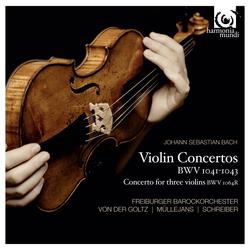 The
recording of the violin concertos on the Teldec Complete Bach Edition
(Recording of the Month – review),
though by no means poor, is not one of the best constituents of
that recording. Prior to its release on April 20th on USB I promised
in my last Download News to continue to nominate some alternatives;
could this newly-released album be the ideal period-instrument alternative
for these concertos?
The
recording of the violin concertos on the Teldec Complete Bach Edition
(Recording of the Month – review),
though by no means poor, is not one of the best constituents of
that recording. Prior to its release on April 20th on USB I promised
in my last Download News to continue to nominate some alternatives;
could this newly-released album be the ideal period-instrument alternative
for these concertos?
In fact, it isn’t a direct replacement: both include the three
‘standard’ concertos, BWV1041-3, but the Teldec concludes
with BWV1054R and BWV1060R, the latter a reconstruction for violin and
oboe, both convincing alternative versions of works which exist only
as keyboard concertos. The new recording instead offers the putative
three-violin original of BWV1064R, less commonly performed but another
convincing reconstruction of a concerto which survives for three keyboard
instruments. In hard economic terms, that would give the Teldec at 73
minutes the advantage over the new release’s 61 minutes if matters
were otherwise equal.
Performance-wise, however, the new recording has all the energy that
I thought slightly wanting from the Harnoncourts on Teldec. There’s
sensitivity, too, especially in the slow movements, without making these
sound sentimental, and the recording has the advantage of modern sound,
with the download available in mp3 and 16-bit lossless and for a little
more in 24/96 lossless. I see that I’m not alone in regarding this
new release very highly: one magazine has just awarded an ‘outstanding’
accolade and Simon Thompson has made it a Recording of the Month
- review.
This could well be the period-instrument version that outshines all
others, however good, just as the Grumiaux recording has come to outshine
its modern-instrument rivals: BWV1041-3 and 1060R, Decca 420 7002,
mid-price: download for £4.99 as Classic FM recording from 7digital.com,
or Bach: The Essential Masterpieces, 475 8058, 5 budget-price
CDs.
At $16.62, even the 24-bit is competitive with the physical CD. I’m
pleased to see that eclassical.com have also begun to offer pdf booklets
with Harmonia Mundi releases, albeit that they are in what is becoming
the iTunes landscape norm, unsuitable for printing out and inserting
in CD cases. Some of us are old-fashioned enough still to burn some
downloads to CDR for playing in the car or a portable CD player. The
eclassical.com arrangement of allowing purchasers of 24-bit to return
later for 16-bit or mp3 is ideal in that respect, since 24-bit recordings
are unsuitable for burning to CDR.
Teldec include BWV1064R elsewhere in the Complete Edition in a performance
by Christopher Hirons, Monica Huggett and Catherine Mackintosh with
the Academy of Ancient Music conducted by Christopher Hogwood, a 1985
recording borrowed from Decca on CD153 of the Complete Edition. The
latter sounds lighter in tone than the new recording – not entirely
a matter of recording differences: the Freiburgers tend to have a fuller
sound than other period ensembles. Both are enjoyable, with sprightly
outer movements and full weight – slightly more, but not too much
weight, from the Freiburgers – in the slow movement.
If you’re looking for a complete set of the Brandenburg Concertos,
Violin Concertos and almost all of the Keyboard Concertos at a budget
price, let me remind you of the 6-disc Alpha set of Concertos avec
plusieurs instruments which I mentioned in Download
News 2013/5 (ALPHA811).
Johann Sebastian BACH (1685-1750)
Fantasia and Fugue in g minor, BWV542 (‘Great’)*
Fantasia and Fugue in C, BWV545*
Toccata and Fugue in d minor, BWV565*
Prelude and Fugue in e minor, BWV548 (‘Wedge’)**
Chorale Preludes: Jesus Christus, unser Heiland, BWV626**
O Mensch, bewein’ dein’ Sünde groß, BWV622**
Christ lag in Todesbanden, BWV625**
Liebster Jesu, wir sind hier, BWV633**
Wenn wir in höchsten Nöten sein, BWV641***
Ich ruf’ zu dir, Herr Jesu Christ, BWV639***
Herzlich tut mich verlangen, BWV727***
Albert Schweitzer (organ) – rec. *All Hallows Church, Barking by the
Tower, London (1935); **Église Sainte-Aurélie, Strasbourg,
France (1936); ***Simultaneum Church, Gunsbach, Alsace (1951). ADD/mono
BEULAH 1PD63 [70:54] – due for release from iTunes (and amazon.co.uk?)
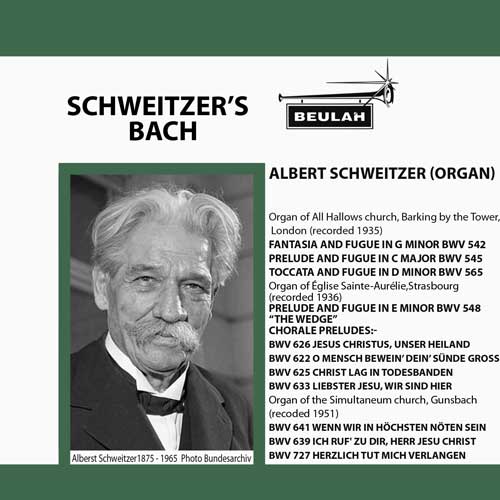 It
was often said that Albert Schweitzer suffered from lack of time off
from his medical and missionary duties at Lambaréné to
practise the organ and his choice of registration was sometimes dubbed
unexciting, but most of us couldn’t play anywhere near as well
as this if we practised for centuries.
It
was often said that Albert Schweitzer suffered from lack of time off
from his medical and missionary duties at Lambaréné to
practise the organ and his choice of registration was sometimes dubbed
unexciting, but most of us couldn’t play anywhere near as well
as this if we practised for centuries.
Beulah have already given us some of these recordings, made for UK and
US Columbia in 1935-6 on 78s and for US Columbia/UK Philips in 1951
on LP, as separate files – BWV542, 545 and 565 on 3-5BX60 – December
2010 Download
Roundup – but this album is very welcome indeed. The playing may
not quite be perfect but the majesty of the music comes over perhaps
even more forcefully than on the recent Ton Koopman performances on
the Teldec Complete Bach Edition which I’ve just reviewed on USB
– here.
Nor does Schweitzer linger unduly over the music – though he was known
for slow tempi, his recording of BWV565 is just seconds slower than
Koopman’s. Both performances make me wish that we could safely
attribute this work to JS Bach again.
Even the earliest recordings sound very well indeed – I was about to
add ‘for their age’, but no apology need be given. If I didn’t
know better I’d think that Beulah had tried to bamboozle us with
more recent recordings or had resorted to prestidigitation. I’ve
been a little harsh on this month’s Bruckner from Beulah, but this
Schweitzer Bach more than makes up. The 1936 recordings have slightly
less presence than their predecessors from a year earlier, but still
sound remarkably well.
The last recordings here, made in Schweitzer’s home town of Gunsbach,
Alsace, now in France, are the least interesting – by that time his
tempi had become really slow: his account of BWV641 takes more than
twice as long as Koopman’s – but the album is highly valuable for
the earlier recordings.
In 1936 the first instalment of Schweitzer’s Bach came on seven 12"
records and cost two guineas (£2.10, but worth around £100
now).
Domenico ZIPOLI (1688-1726)
If you heard the new Archbishop of Canterbury’s selection of music
on Classic FM on Easter morning, you may have been intrigued by his
penultimate item, described as Elevazione by the Jesuit composer
Domenico Zipoli and wondered how a baroque composer came to write such
a fruity piece of music. The short answer is that he didn’t, but
he did compose two pieces for organ entitled all’ Elevazione,
to be played in church at the point where the sanctified Host is held
up to be seen, the Elevation. Modern editors have fused these two organ
pieces together and souped them up in arrangements for orchestra, sometimes
with organ and other instruments. The result is rather akin to Giazzotto’s
arrangement of ‘Albinoni’s Adagio’, except that
there probably never was an Albinoni original of that work, which Giazzotto
claimed to have discovered and then lost.
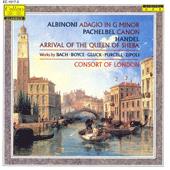
The Archbishop’s chosen recording was on the Collins Classics
label – now defunct but available from various sources for download
– an arrangement played by the Consort of London conducted by Robert
Haydon Clark (CC-1017 [56:19] – download from eclassical.com,
mp3 and lossless; no booklet). Entitled Baroque Orchestra Music, it
also contains that self-same ‘Albinoni’ Adagio, Pachelbel’s
Greatest Hit, the Canon, Handel’s Arrival of the Queen
of Sheba plus music by Bach, Boyce, Gluck and the Zipoli Elevazione.
If this kind of middle-of-the-road performance style is your cup of
tea – neither authentic nor overboard modernized – you should
enjoy this collection; the playing is certainly polished.
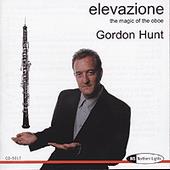 Eclassical.com
also have a more recent recording of an arrangement for oboe, organ
and orchestra, performed by Gordon Hunt (oboe) and the Norrköping
Orchestra (Elevazione – the Magic of the Oboe: BIS BIS-NL-CD-5017
[58:20], mp3, 16– and 24-bit lossless, with pdf booklet). Though
not performed by baroque specialists, purists may find it sounding a
little more authentic than the Collins; it’s certainly enjoyable.
For full details see review
by Gwyn Parry-Jones.
Eclassical.com
also have a more recent recording of an arrangement for oboe, organ
and orchestra, performed by Gordon Hunt (oboe) and the Norrköping
Orchestra (Elevazione – the Magic of the Oboe: BIS BIS-NL-CD-5017
[58:20], mp3, 16– and 24-bit lossless, with pdf booklet). Though
not performed by baroque specialists, purists may find it sounding a
little more authentic than the Collins; it’s certainly enjoyable.
For full details see review
by Gwyn Parry-Jones.
 If
you’re looking for the original organ pieces, you’ll find
them, too, on eclassical.com
in a 1998 programme of Zipoli’s works for that instrument performed
by Lorenzo Ghielmi: Opere per organo (Ars Musici AM12692
[79:12], mp3 and lossless). If you read my recent review
of Ghielmi’s performance of Handel Organ Concertos on Passacaille
PAS990, or Peter Wells on his Frescobaldi (DHM 74321 935472
– review:
no longer available?), you’ll expect his contribution to be very
distinguished. The vocal items are performed by Canto Fermo. There’s
no booklet but subscribers to Naxos Music Library can sample all three
recordings there and download the BIS and Ars Musici booklets. If you
are just looking for mp3, classicsonline.com
have that with the booklet for just £4.99 – slightly less
than eclassical.com, but only the latter have the lossless download.
If
you’re looking for the original organ pieces, you’ll find
them, too, on eclassical.com
in a 1998 programme of Zipoli’s works for that instrument performed
by Lorenzo Ghielmi: Opere per organo (Ars Musici AM12692
[79:12], mp3 and lossless). If you read my recent review
of Ghielmi’s performance of Handel Organ Concertos on Passacaille
PAS990, or Peter Wells on his Frescobaldi (DHM 74321 935472
– review:
no longer available?), you’ll expect his contribution to be very
distinguished. The vocal items are performed by Canto Fermo. There’s
no booklet but subscribers to Naxos Music Library can sample all three
recordings there and download the BIS and Ars Musici booklets. If you
are just looking for mp3, classicsonline.com
have that with the booklet for just £4.99 – slightly less
than eclassical.com, but only the latter have the lossless download.
Anton BRUCKNER (1824-1896)
Mass No.2 in e minor [31:59]
Te Deum in C [21:37]
Agnes Giebel (soprano), Marga Höffgen (contralto), Josef Traxel
(tenor), Gottlob Frick (bass);
Choir of St. Hedwig’s Cathedral, Berlin
Berlin Philharmonic Orchestra/Karl Forster – rec. 1957. ADD/stereo
BEULAH 1PD79 [53:36] – from iTunes
and amazon.co.uk
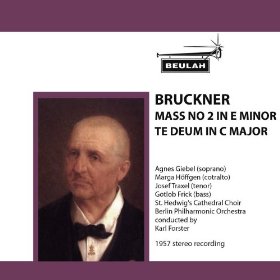 The
Te Deum was reissued in mono only, coupled with Brahms’ German
Requiem on HMV Concert Classics XLP30073/4 in 1967, at which time
Edward Greenfield lamented that the Mass had not also been reissued,
since it was otherwise unavailable. Autre temps … we now
have more than one recording, but there’s a clear first choice for all
three Bruckner Masses on a 2-CD DG Originals set, conducted by Eugen
Jochum (447 4092 – download from deutschegrammophon.com,
mp3 or flac) and that’s the recording to which I frequently turn and
which I recommend.
The
Te Deum was reissued in mono only, coupled with Brahms’ German
Requiem on HMV Concert Classics XLP30073/4 in 1967, at which time
Edward Greenfield lamented that the Mass had not also been reissued,
since it was otherwise unavailable. Autre temps … we now
have more than one recording, but there’s a clear first choice for all
three Bruckner Masses on a 2-CD DG Originals set, conducted by Eugen
Jochum (447 4092 – download from deutschegrammophon.com,
mp3 or flac) and that’s the recording to which I frequently turn and
which I recommend.
Though it’s easy to agree with Andrew Porter’s assessment of the Mass
in 1957 as grave and constantly beautiful, I fear that the Jochum CD
set eclipses it as a recording; the sound which, in 1957, was adjudged
‘very skilfully done’ now seems impossibly thin and undernourished by
comparison with the excellent results which Beulah normally achieve
with recordings of this vintage. I didn’t even find my ear adjusting
as much as usually happens with elderly recordings, including the Schweitzer
Bach (above).
Despite the work’s thick textures, the recording of the Te Deum
is a considerable degree more amenable; though not ideal, it allowed
me to enjoy this very fine performance of my favourite Bruckner choral
work.
A mixed blessing, then, but well worth having for the asking price of
around £7, if only for the Te Deum.
Nikolay RIMSKY-KORSAKOV (1844-1908)
Capriccio espagnol, Op/34 [14:58]
Piano Concerto in c# minor, Op.30 [14:16]
The Tale of Tsar Saltan, Suite, Op.57 [19:46]
Sadko, musical picture, Op.5 [12:20]
Russian Easter Festival Overture, Op.36 [14:10]
Noriko Ogawa (piano)
Malaysian Philharmonic Orchestra/Kees Bakels – rec. November 2003.
DDD.
BIS BIS-CD-1387 [75:20] – from eclassical.com
(mp3, 16– and 24-bit lossless)
[‘This is a gorgeous recording, highly recommended.’ See review
by Paul Shoemaker.]
Comparative version:
Symphony No. 1, Op.1 in e minor [28:02]
Symphony No. 2 ‘Antar’, Op.9 [32:30]
Capriccio espagnol, Op.34 [16:18
Symphony No. 3 in C, Op.32 (1886 version) [37:15]
Russian Easter Festival Overture, Op.36 [15:43]
Sadko, Op.5 [13:12]
Piano Concerto in c# minor, Op.30 [13:23]
Geoffrey Tozer (piano); Bergen Philharmonic Orchestra/Dmitri Kitajenko
– rec.1993. DDD
Pdf booklet available
CHANDOS COLLECT CHAN6613 [2 CDs for the price of one: 156:43]
– from theclassicalshop.net
(mp3 and lossless) [reviewed in March 2010 Download
Roundup]
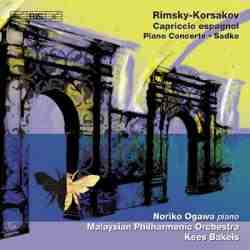 The
BIS recording has not appeared on SACD, as Paul Shoemaker hoped
it would, but the 24-bit download partly makes amends for that. The
performance is every bit as recommendable as PS says.
The
BIS recording has not appeared on SACD, as Paul Shoemaker hoped
it would, but the 24-bit download partly makes amends for that. The
performance is every bit as recommendable as PS says.
The Chandos twofer offers an inexpensive alternative and now
comes with the pdf booklet that I couldn’t find when I reviewed
it in 2010.
Vincent D’INDY (1851-1931)
Symphonie sur un Chant montagnard français, Op.25 ‘Symphonie
cévenole’* (1886) [26:28]
Prelude to Act I of ‘Fervaal’, Op.40 (1895) [5:13]
Saugefleurie, Op.21 Legend after Robert de Bonnières (1850-1905)
(1884) [15:54]
Médée, Op.47 Orchestral suite after the tragedy
by Catulle Mendès (1841-1909) (1898) [25:34]
*Louis Lortie (piano)
Iceland Symphony Orchestra/Rumon Gamba
rec. 29 October-1 November 2012, Harpa Concert Hall, Reykjavik, Iceland
Pdf booklet included
CHANDOS CHAN10760 [73:41] – from theclassicalshop.net
(mp3, 16-bit lossless & 24/96 Studio)
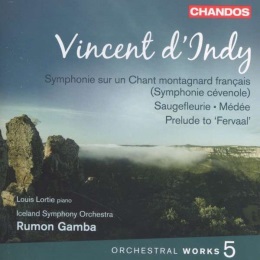 I’ve
welcomed earlier instalments in this series; I reviewed the CDs of Vols.
1 and 4 on the MWI site (review
review)
and the high-res download for Download Roundup (review).
The intervening discs are every bit as desirable, for this Icelandic
orchestra played with a suavity and sheen that suits this music very
well indeed. At the helm is British-born conductor Rumon Gamba, whose
Malcolm Arnold recordings with the BBC Phil are much-played here at
chez Mahlerei. This new d’Indy collection boasts French-Canadian
pianist Louis Lortie in the symphony and some rarely heard pieces as
well, all recorded in the Harpa Concert Hall, the orchestra’s new
home.
I’ve
welcomed earlier instalments in this series; I reviewed the CDs of Vols.
1 and 4 on the MWI site (review
review)
and the high-res download for Download Roundup (review).
The intervening discs are every bit as desirable, for this Icelandic
orchestra played with a suavity and sheen that suits this music very
well indeed. At the helm is British-born conductor Rumon Gamba, whose
Malcolm Arnold recordings with the BBC Phil are much-played here at
chez Mahlerei. This new d’Indy collection boasts French-Canadian
pianist Louis Lortie in the symphony and some rarely heard pieces as
well, all recorded in the Harpa Concert Hall, the orchestra’s new
home.
Some recent Chandos issues have been a tad disappointing – musically
and sonically – but the Sir Andrew Davis/Bergen Philharmonic collection
of Berlioz overtures and Neeme Järvi’s Raff taster are definitely
not among them (review).
From the first frisson-inducing start of d’Indy’s Op.
25, based on a French folk song he heard in the Cévennes, it’s
clear we’re in for another treat. The misty, rhapsodic character
of this music is superbly realised by performers and engineers alike;
Lortie’s central, nicely integrated contributions are well nigh
perfect, and if the recording is anything to go by this new auditorium
has excellent acoustics. As for those spirited tunes and sizzling tuttis
in the third movement, they have tremendous vitality and lift.
Goodness, what an ear-tickling opener this is, and how tempting to keep
on hitting the repeat button. But stay your hand, dear reader, for the
rest of this collection is just as alluring. The Act I prelude to d’Indy’s
opera Fervaal is Wagnerian, albeit softer of focus and more economical
of means. This music has a lovely pulse and it glows with a gentle radiance
that’s simply ravishing. The opera is no longer performed –
although there have been concert performances in recent years –
but this atmospheric little prelude would be most welcome in any programme.
Saugefleurie, a typically Romantic tale of love between a huntsman
– cue gorgeous horn calls – and a fairy. Yes, it’s also
inspired by Wagner but there’s a thrust – a more urgent narrative,
if you will – that makes for a surprisingly taut and varied exposition.
There’s plenty of amplitude here too, and in the quieter passages
Gamba teases out the score’s shimmering colours, flits and fibrillations.
By contrast d’Indy’s incidental music to compatriot Catulle
Mendès’ verse play Médée is rather
more clear-eyed, yet it never relinquishes the seamless line and sensuous
detail of the composer’s earlier orchestral pieces. Dynamics are
sensitively – and realistically – managed as well, the opening
to L’Attente de Médée (tr. 11) wonderfully
hushed yet easily heard. Really, the music-making and sonics evident
on this Studio download are beyond reproach.
Subtle, sense-stroking music, beautifully played and recorded; indecently
satisfying.
Dan Morgan
http://twitter.com/mahlerei
As so often happens, Dan and I both listened to this recording and were
equally impressed with the 24/96 version so, in order to ring the changes
slightly, I also tried the ‘ordinary’ 16-bit lossless version,
which works out slightly less expensive. If you feel that you can’t
run to the £15.99 cost of the premium version, I doubt that you
will be disappointed with the £9.99 alternative.
The Romantic Violin Concerto: 14
Alexander GLAZUNOV (1865-1936) Violin Concerto in a minor, Op.82
[20:52]
Meditation, Op.32 [4:15]
Mazurka-Oberek in D for violin and orchestra [9:56]
Othmar SCHOECK (1886-1957) Concerto quasi una fantasia
for violin and orchestra in B flat, Op.21 [34:06]
Chloë Hanslip (violin)
Orchestra della Svizzera Italiana/Alexander Vedernikov – rec. October
2011
Pdf booklet included
HYPERION CDA67940 [69:11] – from hyperion-records.co.uk
(mp3, 16– and 24-bit lossless)
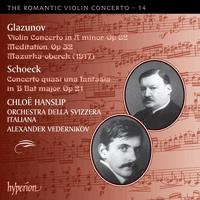 That
the Glazunov concerto seems to receive a rhapsodic rather than a virtuoso
performance is more the result of the somewhat unadventurous orchestral
accompaniment, but even Chloë Hanslip plays with rather more restraint
than is usual in this work. There are swings and roundabouts in that
the music sounds more focused and integrated than usual but less exciting,
even in the finale – only the very end takes off as it might.
That
the Glazunov concerto seems to receive a rhapsodic rather than a virtuoso
performance is more the result of the somewhat unadventurous orchestral
accompaniment, but even Chloë Hanslip plays with rather more restraint
than is usual in this work. There are swings and roundabouts in that
the music sounds more focused and integrated than usual but less exciting,
even in the finale – only the very end takes off as it might.
[Rob
Barnett reacted differently to this version of the Glazunov and
made the CD Recording of the Month]
It goes without saying that the more meditative approach is much better
suited to Meditation and the Mazurka also receives an
attractive performance. The main attraction of this recording, however,
is the Schoeck concerto, a work that I don’t recall ever hearing
– the only music by Schoeck that I know is his setting of Lebendig
begraben, as sung by Dietrich Fischer-Dieskau, but the quality of this
concerto quasi una fantasia is such – a favourite of MusicWeb International
editor Rob Barnett, as noted in his profile
– that I hope to explore in a future DL News his Cello Concerto,
of which there are two BIS recordings with Christian Poltéra.
Michael Cookson was not enthusiastic about the one on BIS-CD-1737
– review.
Once again the style of performance on Hyperion suits the Schoeck concerto
well. With good recording, sounding fine even though I initially left
the DAC at the wrong, 24/44.1, setting*, the usual Hyperion quality
evident in the notes and other recordings of the Glazunov to turn to
if you find this a little too rhapsodic, the pluses outweigh the minuses
here.
* clearly much better at the correct 24/96 setting. The one small problem
with the Dragonfly DAC is that it has to be set manually. With Hyperion
you need to check whether they have used 88.2 or 96kHz.
Vitežslav NOVÁK (1870-1949)
In the Tatra Mountains, Op.26 [16:15]
Eternal Longing, Op.33 [19:56]
Slovak Suite, Op.32 [31:40]
Royal Liverpool Philharmonic Orchestra/Libor Pešek – rec.
c. 1996.DDD.
VIRGIN CLASSICS 5452512 [67:48] – from amazon.co.uk
(mp3)
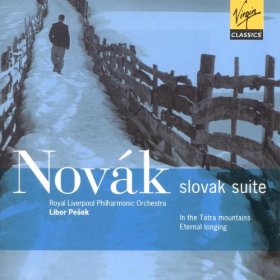 At
the Church, the opening movement of the Slovak Suite, also
known as the Moravian-Slovak Suite, was another of the pieces
which the Archbishop of Canterbury chose for his Easter morning programme
on Classic FM. This recording, from the RLPO and Libor Pešek, the
version which he chose, is not generally available on CD (I’ve
given its last known catalogue number, from 2003), so download is the
obvious route and amazon.co.uk offer the least expensive way to go (£5.99
at the time of writing; £6.99 in superior 320kbs sound from classicsonline.com).
With this version you also obtain good modern recordings of Novák’s
two major orchestral works, In the Tatras and About the Eternal
Longing – all very evocative though not, perhaps, quite as
immediately appealing as At the Church.
At
the Church, the opening movement of the Slovak Suite, also
known as the Moravian-Slovak Suite, was another of the pieces
which the Archbishop of Canterbury chose for his Easter morning programme
on Classic FM. This recording, from the RLPO and Libor Pešek, the
version which he chose, is not generally available on CD (I’ve
given its last known catalogue number, from 2003), so download is the
obvious route and amazon.co.uk offer the least expensive way to go (£5.99
at the time of writing; £6.99 in superior 320kbs sound from classicsonline.com).
With this version you also obtain good modern recordings of Novák’s
two major orchestral works, In the Tatras and About the Eternal
Longing – all very evocative though not, perhaps, quite as
immediately appealing as At the Church.
For equally authoritative alternatives of Novák’s music
on Supraphon:
• Eternal Longing; Moravian-Slovak Suite; In the
Tatras: Czech Philharmonic, Brno State PO/Karel Sejna (see review)
– from amazon.co.uk
or
emusic.com (both mp3): see July 2011/2 Roundup
– also on Naxos Classical Archives, without Eternal Longing,
from classicsonline.com
(mp3)
• Slovak Suite, Melancholic Songs of Love, Serenade
in F for small orchestra: Prague Chamber Philharmonic Orchestra/Jiři
Bělohlávek – from amazon.co.uk
or emusic.com
(both mp3)
Recording of the Month
Ralph VAUGHAN WILLIAMS (1872-1958)
 Symphony
No. 5 in D (1938-43) [38:47]
Symphony
No. 5 in D (1938-43) [38:47]
Symphony No. 8 in d minor (1953-55) [29:17]
Hallé Orchestra/Sir Mark Elder – rec. live, 9 November 2011,
3 February 2012, DDD.
HALLÉ CDHLL7533 [68:21] – from emusic.com
(mp3)
[‘This splendid disc maintains the high standards of the stream
of recordings by Sir Mark Elder and the Hallé. I hope they will
continue to record Vaughan Williams symphonies.’ See review
by John Quinn: a Recording of the Month.]
 Like
John Quinn, with this recording, which follows on the earlier success
of The Wasps (CDHLD7510), the London Symphony and Oboe
Concerto (CDHLL7529), I’m hopeful that the Hallé
and Mark Elder are due to give us all the VW symphonies and Job
– the latter of which, again like JQ, I consider as great a masterpiece
as the London Symphony and the Fifth, recorded here. At the time
of writing only amazon.com and emusic.com appear to offer this as a
download; the emusic.com price of £3.36 is less than half of amazon.co.uk’s
and the bit-rate (around 230kb/s) is little inferior. You may wish,
however, to wait for classicsonline.com to offer this along with the
other Hallé/Elder recordings at 320kb/s.
Like
John Quinn, with this recording, which follows on the earlier success
of The Wasps (CDHLD7510), the London Symphony and Oboe
Concerto (CDHLL7529), I’m hopeful that the Hallé
and Mark Elder are due to give us all the VW symphonies and Job
– the latter of which, again like JQ, I consider as great a masterpiece
as the London Symphony and the Fifth, recorded here. At the time
of writing only amazon.com and emusic.com appear to offer this as a
download; the emusic.com price of £3.36 is less than half of amazon.co.uk’s
and the bit-rate (around 230kb/s) is little inferior. You may wish,
however, to wait for classicsonline.com to offer this along with the
other Hallé/Elder recordings at 320kb/s.
I’ve made this a Recording of the Month although
the accolade has already been given; it’s as good as the versions
listen below but I hesitate to recommend this recording to the exclusion
of all the other fine versions, especially of the Fifth, which I regard
as the masterpiece among the VW symphonies:
• Chandos CHSA5004/CHAN9666: LSO/Richard Hickox (with Valiant
for Truth, etc.) – review
of complete symphonies on USB (no longer available in that form, but
available on CD and download).
• EMI Classics for Pleasure 573112: RLPO/Vernon Handley
(with Flos Campi, Oboe Concerto) – also 5757602 (complete
symphonies, Job, etc.)
• Decca 473 2412: LPO/Sir Adrian Boult (complete symphonies:
mono/stereo – review)
– Nos. 1-8 formerly available separately from Australian Eloquence
– review.
(No longer available.) Symphony No.5 on Naxos Classical Archives 9.80372.
• EMI British Composers 0874842: LPO, NPO/Sir Adrian Boult
(complete symphonies)
• Warner Classics 2564698483: BBCSO/Andrew Davis (complete
symphonies, Job, etc.)
• EMI CDC5554872: Bernard Haitink (with Lark Ascending,
Norfolk Rhapsody No.1) – deleted on CD, even as part of
the complete set, but download available from classicsonline.com
(mp3) or stream from Naxos Music Library
Of these the mono Boult recording remains my benchmark for this symphony
and the recording sounds remarkably well for its age, even in the very
inexpensive (currently £4.99) Classical Masters download from
amazon.co.uk
which I reviewed in the November 2010 Roundup.
Symphony No.8 (in addition to complete sets listed above):
• Chandos CHAN10103/CHSA5016: LSO/Richard Hickox (with Symphony
No.6, Nocturne)
• Naxos Classical Archives 9.80006: Hallé/Sir John
Barbirolli (with BAX Garden of Fand; BUTTERWORTH
Shropshire Lad)
The Naxos transcription of the Barbirolli recording doesn’t seem
to improve much on the Pye Golden Guinea LP which I used to own but
the performance is good enough to make me forget the thin recording.
Ralph VAUGHAN WILLIAMS (1872-1958)
Serenade to Music [13:34]
Five Mystical Songs for baritone, chorus and orchestra* [19:20]
Fantasia on Christmas Carols* [12:26]
Flos Campi** [22:13]
Serenade: Elizabeth Connell, Amanda Roocroft, Anne Dawson, Linda Kitchen
(soprano), Sarah Walker, Catherine Wyn-Rogers (mezzo) John Mark Ainsley,
Martyn Hill, Maldwyn Davies (tenor), Alan Opie, Sir Thomas Allen (baritone),
Gwynne Howell, John Connell (bass)
Sir Thomas Allen (baritone)*
Nobuko Imai (viola)**
Corydon Singers; English Chamber Orchestra/Matthew Best
Pdf booklet included
HYPERION CDA66420 or CDA30025 [67:33] – from hyperion-records.co.uk
(mp3 and lossless)
Dona Nobis Pacem, Cantata for soprano, baritone, chorus and orchestra
[35:58]
Five Mystical Songs for baritone, chorus and orchestra [20:29]
Edith Wiens (soprano), Brian Rayner Cook (baritone)
London Philharmonic Choir; London Philharmonic Orchestra/Bryden Thomson
– rec. 1988. DDD.
Pdf booklet available
CHANDOS CHAN8590 [59:35] – from theclassicalshop.net
(mp3 and lossless)
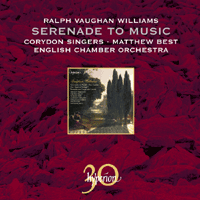
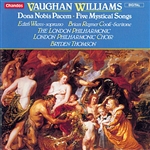 The
third work which I’ve included from Archbishop Welby’s Easter
morning programme is the first of VW’s Five Mystical Songs,
Rise, heart, thy Lord is risen, a wonderful setting of a marvellous
Easter poem by my favourite metaphysical poet George Herbert. Either
of these recordings will serve very well to introduce you to the complete
set and each comes with equally evocative music as coupling(s) –
Dona Nobis Pacem on Chandos and Flos Campi on Hyperion.
The two were reviewed together in my March 2010 Roundup.
There are two numbers for the Hyperion because it was reissued in their
30th-anniversary edition – see October 2010 Roundup:
less expensive on CD but the same price as a download; both remain available
– at the same price as downloads.
The
third work which I’ve included from Archbishop Welby’s Easter
morning programme is the first of VW’s Five Mystical Songs,
Rise, heart, thy Lord is risen, a wonderful setting of a marvellous
Easter poem by my favourite metaphysical poet George Herbert. Either
of these recordings will serve very well to introduce you to the complete
set and each comes with equally evocative music as coupling(s) –
Dona Nobis Pacem on Chandos and Flos Campi on Hyperion.
The two were reviewed together in my March 2010 Roundup.
There are two numbers for the Hyperion because it was reissued in their
30th-anniversary edition – see October 2010 Roundup:
less expensive on CD but the same price as a download; both remain available
– at the same price as downloads.
If you don’t share my reaction to the Serenade to Music –
it leaves me cold, surprisingly so because I’m a great VW fan and
I once played Lorenzo in Merchant of Venice, whose words form
the text of the Serenade – the only other reason not to choose
the Hyperion would be that you don’t want to hear the Christmas
music all year round.
Bargain hunters will probably be contented with another Hyperion offering,
on the budget Helios label (CDH55004), but, pace Gerald Fenech’s
4-star review,
that comes with what I find an undernourished account of VW’s rumbustious
Tudor Portraits, a work best heard on another Chandos recording
(CHAN9593, with Dives and Lazarus). A safer bargain can
be found on EMI: Hickox conducts Vaughan Williams, a 2-CD set
available as a download for a mere £4.99 from sainsburysentertainment.com.
Bargain of the Month
Gustav HOLST (1874-1934)
 A
Somerset Rhapsody, Op.21 (1906/1907) [9:41]
A
Somerset Rhapsody, Op.21 (1906/1907) [9:41]
Brook Green Suite (1933) [6:25]
Ballet Music: The Perfect Fool, Op.39 (1918/1922) [10:42]
Suite: The Planets, Op.32 (1914/1916) [48:33]
Suite No.2 in F, for military band, Op.28/2 (1911) [12:24]
St Paul’s Suite, Op.29/1 (1913) [19:39]
Egdon Heath, Op.47 [14:45]
Choral Hymns from the Rig Veda (Group Two) Op.26/2 (1909) [13:52]
A Choral Fantasia, Op.51 (1930) [17:14]
Bournemouth Sinfonietta/Norman del Mar (Somerset Rhapsody and Brook
Green)
London Symphony Orchestra/André Previn (Perfect Fool and Egdon
Heath);
Geoffrey Mitchell Choir, London Philharmonic Orchestra/Sir Adrian Boult
(Planets);
Central Band of the RAF/Wing Commander Eric Banks (2nd Suite);
Royal Philharmonic Orchestra/Sir Malcolm Sargent (St Paul’s Suite);
London Symphony Chorus, London Philharmonic Orchestra/Sir Charles Groves
(Rig Veda);
Janet Baker (mezzo), Ian Partridge (tenor), Purcell Singers (chorus
master: Ralph Downes), English Chamber Orchestra/Imogen Holst (Choral
Fantasia)
EMI CLASSICS 6278982 [75:22 + 70:55] – from sainburysentertainment.co.uk
(mp3)
[‘An important re-issue which serves to show us just how fine a
composer Holst was, how varied his works are, and how much we are missing
from our concert halls’. See review
by Bob Briggs.]
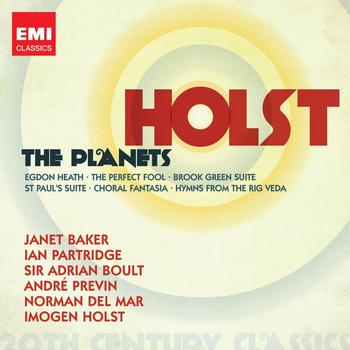 Bargain-hunters
who are looking for a version of The Planets won’t find
anything finer than Boult’s last recording included here, the culmination
of more than six decades of conducting the work. When it appeared in
1979 on ASD3649, Edward Greenfield rightly hailed it as ‘the supreme
Boult performance’. That recording can be found online for as little
as £4.99, coupled with Boult’s Enigma Variations,
but for a little more you can discover some of the other gems from Holst’s
varied output, all in good or very good performances. Colin Matthews’
continuation, Pluto, isn’t included – for that you
need to turn to Simon Rattle with the Berlin Phil or, at budget price,
Mark Elder and the Hallé (Hyperion Helios CDH55350 –
review
and June 2012/2 Roundup).
Bargain-hunters
who are looking for a version of The Planets won’t find
anything finer than Boult’s last recording included here, the culmination
of more than six decades of conducting the work. When it appeared in
1979 on ASD3649, Edward Greenfield rightly hailed it as ‘the supreme
Boult performance’. That recording can be found online for as little
as £4.99, coupled with Boult’s Enigma Variations,
but for a little more you can discover some of the other gems from Holst’s
varied output, all in good or very good performances. Colin Matthews’
continuation, Pluto, isn’t included – for that you
need to turn to Simon Rattle with the Berlin Phil or, at budget price,
Mark Elder and the Hallé (Hyperion Helios CDH55350 –
review
and June 2012/2 Roundup).
The best combination of sound quality (320kb/s, doing as much justice
to the originals as you’ll find, short of lossless quality) and
price (£5.99) is to be found by following the link to sainsburysentertainment.co.uk.
Dmitri SHOSTAKOVICH (1906-1975)
Cello Concerto No.1 in E-flat, Op.107* [29:48]
Sonata for Cello and Piano in d minor, Op.40** [29:53]
Moderato for Cello and Piano** [3:22]
Emmanuelle Bertrand (cello)
Pascal Amoyal (piano)**
BBC National Orchestra of Wales/Pascal Rophé* – rec. March
2012. DDD.
Pdf booklet included.
HARMONIA MUNDI HMC902142 (34112536) [63:02] – from eclassical.com
(mp3, 16– and 24-bit lossless)
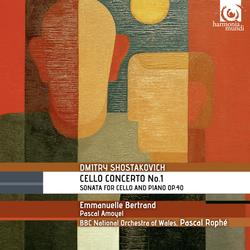 This
new recording is well worth considering if you want the coupling, but
it is up against strong competition. We weren’t exactly short of
very good recordings of the Shostakovich Cello Concerto No.1, variously
coupled, including the performance by the work’s dedicatee, Mstislav
Rostropovich, recently reissued at budget price on Regis RRC1385
with the Violin Concerto (David Oistrakh) – review
– and, earlier, in the same coupling by Sony (MHK66327).
The Rostropovich recording of Cello Concerto No.1 is also re-united
with its original partner, Symphony No.1 on a recent Sony reissue (88697858322).
There’s even an inexpensive recording of the two Cello Concertos,
the Cello Sonata, Moderato and Viola Sonata from Raphael Wallfisch
(Nimbus NI5764 – review),
a 2-CD set for £16 – here
– so the new recording is not ground-breaking. You may also wish
to consider other recordings which I discussed in my January 2012/2
Download
Roundup – both the EMI Triple package which I made Bargain
of the Month and the then new Chandos recording of the two cello
concertos discussed in the context of rival versions later in that Roundup.
This
new recording is well worth considering if you want the coupling, but
it is up against strong competition. We weren’t exactly short of
very good recordings of the Shostakovich Cello Concerto No.1, variously
coupled, including the performance by the work’s dedicatee, Mstislav
Rostropovich, recently reissued at budget price on Regis RRC1385
with the Violin Concerto (David Oistrakh) – review
– and, earlier, in the same coupling by Sony (MHK66327).
The Rostropovich recording of Cello Concerto No.1 is also re-united
with its original partner, Symphony No.1 on a recent Sony reissue (88697858322).
There’s even an inexpensive recording of the two Cello Concertos,
the Cello Sonata, Moderato and Viola Sonata from Raphael Wallfisch
(Nimbus NI5764 – review),
a 2-CD set for £16 – here
– so the new recording is not ground-breaking. You may also wish
to consider other recordings which I discussed in my January 2012/2
Download
Roundup – both the EMI Triple package which I made Bargain
of the Month and the then new Chandos recording of the two cello
concertos discussed in the context of rival versions later in that Roundup.
If you don’t want the second Cello Concerto, which I must admit
doesn’t have the attractive power of the first, but would like
the Cello Sonata, you wouldn’t go far wrong with the new Harmonia
Mundi recording; all the power of the Rostropovich performance is here
and the cellist is well supported in the concerto and sonata in a much
more recent recording, sounding especially well in 24/96 format.
Recording of the Month
Benjamin BRITTEN (1913-1976)
 Piano
Concerto, Op.13 (revised 1945 version [33:19]
Piano
Concerto, Op.13 (revised 1945 version [33:19]
Original third movement, ‘Recitative and Aria’ [9:33]
Violin Concerto in d minor Op.15 [33:10]
Tasmin Little (violin)
Howard Shelley (piano)
BBC Philharmonic/Edward Gardner – rec. September 2012. DDD.
Pdf booklet available
CHANDOS CHAN10764 [76:30] – from theclassicalshop.net
(mp3, 16– and 24-bit lossless)
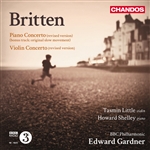 With
a classic coupling of these two concertos available from Decca at mid
price and with the composer in charge (E417 3082) Chandos have
gone straight for the jugular of the opposition. With the addition of
the original third movement of the Piano Concerto as part of the deal,
they are also challenging Hyperion’s recording of the complete
works for piano and orchestra, which also offers that original movement
(CDA67625 – Recording of the Month –
review
and Hyperion Top 30 Roundup).
With
a classic coupling of these two concertos available from Decca at mid
price and with the composer in charge (E417 3082) Chandos have
gone straight for the jugular of the opposition. With the addition of
the original third movement of the Piano Concerto as part of the deal,
they are also challenging Hyperion’s recording of the complete
works for piano and orchestra, which also offers that original movement
(CDA67625 – Recording of the Month –
review
and Hyperion Top 30 Roundup).
I’m not about to jettison either of these recordings of the Piano
Concerto or Joanna Macgregor’s with Steuart Bedford and the ECO,
also with the original third movement (the Collins Classic CD which
I own is now replaced on Naxos 8.557197) but the new recording
has advantages in one respect or another over all of them, not least
its availability in 24/96 format. It’s the only digital recording
to couple the two concertos and it’s hard to deny that the Violin
Concerto makes a more substantial offering than either the Hyperion
or the Naxos. If, however, Linn were to offer the Decca recording in
one of their Studio Master refurbishments – 24/96 versions which
draw the best out of the master tapes, as with their release of Peter
Grimes (UNI012
– March 2012/2 Roundup)
– even the nerdiest among us might have to think again.
If anything, there’s even tougher competition in the Violin Concerto
in all price ranges – two attractive versions even at the lowest
price, Maxim Vengerov on EMI, with the Walton Viola Concerto and Rebecca
Hirsch on Naxos, coupled with the Cello Symphony – and with a variety
of couplings but, again, the new recording can hold its own. Don’t
jettison the Decca if you own it, but do add the new recording.
Discovery of the Month
François COUTURE (b.?) Mysteria Rosarii Oratorio
 Yosef
(soloist)
Yosef
(soloist)
Ensemble Vocal Cantus Novus
Quatuor Boréal – rec? © 2013.
DISQUES BOGHEI RECORDS [57:31] – from boghei.com
(mp3)
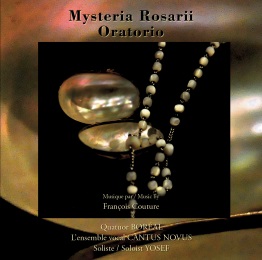 This
recording, billed as a charismatic spiritual experience, arose from
the ability of the anonymous soloist, ‘Yosef’, to speak in
tongues. Contemporary French Canadian composer François Couture
used this as the basis of a series of meditations on the mysteries of
the rosary: Five Joyful Mysteries, Five Sorrowful Mysteries, Five Glorious
Mysteries and Five Luminous Mysteries, to which he has added a final
work in honour St Paul.
This
recording, billed as a charismatic spiritual experience, arose from
the ability of the anonymous soloist, ‘Yosef’, to speak in
tongues. Contemporary French Canadian composer François Couture
used this as the basis of a series of meditations on the mysteries of
the rosary: Five Joyful Mysteries, Five Sorrowful Mysteries, Five Glorious
Mysteries and Five Luminous Mysteries, to which he has added a final
work in honour St Paul.
The concept of setting the rosary to music goes back to the Rosenkranz
or Mystery Sonatas of the baroque composer Heinrich Biber – see
my review
of one of the many available recordings – and Couture’s music,
though contemporary, clearly stands in a recognisable relationship with
the music of that period. Other influences are apparent, too –
the pseudonym given to the soloist suggests a middle-eastern, Jewish
or Arab identity and I certainly hear strands of the music of that area.
I received a choice of download for review, mp3 or lossless flac, and
chose the latter. The link which I’ve given to Disques Boghei indicates
only mp3 availability at the moment; perhaps flac will appear later.
There’s a series of five jpeg images which add up to the booklet,
with an indication of the theme of each of the meditations. No words,
of course, since speaking in tongues doesn’t relate to any language,
though the utterances sound vaguely Semitic. In a sense, the interpretation
is as wordless as Biber’s setting for violin and continuo.
Having read the blurb, I started from a sceptical position – as
an Anglo-Catholic agnostic I’m not into speaking in tongues and
other charismatic manifestations – but soon found myself caught
up in the experience. You’ll find other interesting compositions
on the Boghei website.



 All Nimbus reviews
All Nimbus reviews








